Memory Upgrade: Is It Time To Add More RAM?
The price of memory upgrades is at an all-time low. And more memory is always better, right? We decided to analyze whether or not now could be the time for a fat memory upgrade. As it turns out, there are arguments for and against backing up the truck.
Up To 16 GB Of RAM On A 32-Bit System!
Step 1: Integration of the RAM above the 4 GB limit
Let's turn to implementation. There are a couple of different programs we can use. One of them is the paid version of RAM Disk Plus 10.1. It's very easy to use and reliable. A decent freeware alternative is Gavotte RAM Disk 1.04.
Step 2: Use the "unmanaged" memory as RAM disk
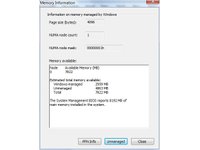
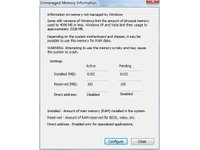
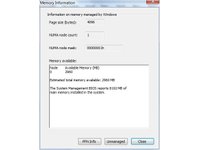
With one of these programs, you can use the memory that otherwise wouldn’t be addressable by a 32-bit operating system. Remember to enable the memory remapping function in your BIOS or nothing will happen.
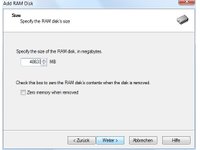
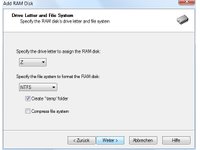
Now we need to format the new drive. When creating the RAM disk, you can even use your "missing" RAM (the memory between the 3.25 GB used by Windows and the 4 GB actually installed), but only if the hardware is compatible. If this causes stability problems, you can try to leave 100 MB or so unused. With current hardware, though, you should be able to use the entire memory area. Don't forget to reboot Windows when you're done.
Step 3: Setting up the swap file
Now fill up the total available space on the RAM disk with the swap file, or at least 4 GB. For this test, we installed 12 GB RAM, so we use a 8 GB swap file. We select the RAM disk as a swap file directory and reboot Windows one more time. From now on, Windows will use all RAM above 4 GB as swap file and the hard drive gets to take a vacation.
Get Tom's Hardware's best news and in-depth reviews, straight to your inbox.
Note: Be careful with sleep mode. It could pose a problem with this approach, so you might have to decide between performance and convenience.
Step 4: Transfer the temporary files to the RAM disk
Since we have 12 GB of RAM installed, we choose to use just 4 GB for the swap file and to use the remaining 4 GB for temporary files. This way, the temp files are written to the fast RAM disk instead of to the slow hard drive, and you also delete the unnecessary files automatically by turning off the PC. Web surfing can be accelerated in this way, simply by relocating the browser cache directories to the RAM disk.
However, we feel that most users can handle the 4 GB restriction. In normal daily life, this amount is sufficient for most tasks, short of bleeding-edge digital video editing, handling giant file archives, or the like. Enthusiasts will probably want to play around and see what amount is enough for their needs.
Current page: Up To 16 GB Of RAM On A 32-Bit System!
Prev Page 32-Bit: Bottlenecks, Tales, And A Trick Next Page Benchmark Results: 32-Bit
Igor Wallossek wrote a wide variety of hardware articles for Tom's Hardware, with a strong focus on technical analysis and in-depth reviews. His contributions have spanned a broad spectrum of PC components, including GPUs, CPUs, workstations, and PC builds. His insightful articles provide readers with detailed knowledge to make informed decisions in the ever-evolving tech landscape
-
doyletdude Hmmm... i'm concerned because i use triple channel so i'm currently at 6gb, which is under recommendation however to upgrade to 12gb might be to much, especially since i've heard that using more RAM slots negativley affects overclocking stability.Reply -
hmp_goose I, too, run an X58 chipset, with Win7-64, and don't know what this article is telling me . . .Reply -
holygigi Finally a good read on Tom's, not a news about a rumor that a fruit company might provide a tease about something shiny.Reply
I use 8GB for about 2 years now, the best thing about it (and I didnt find this covered in the article) is that alt+tab-ing out from a game to windows and back to the game is almost instant. Even the hungriest game uses about 3-3.5 GB. Windows again about 2.5. So you always have 2GB free. Even though I dont have a SSD yet, after the initial slower start of an app (browser, anything), going back to it is instant. For me this is the real benefit of having more ram. The marginal (if any) FPS increase is not the main selling point. Multi-tasking is. -
takeapieandrun Personally, I would say 6GB is nice balance between capacity and cost. 4GB of RAM can become limited at times, but IMO 8GB is a little too much.Reply -
dogman_1234 Nice article. I finally learned something i can be able to use later in my computing life.Reply
My questions are as followed:
1) I am aware SSD's are a applied RAM set. So how can one use your system RAM to store files after shutdown as well.
2) How can one add more memory to the GPU? I can see a noticeable jump in GPU RAM, or GMP as they put it. -
coffee_man i use triple channel but i only got 3 gb of ram, is better to add more ram or buy an ssd ?Reply -
Niva Come on guys, the article and recommendation are pretty straight forward. They're recommending a minimum of 8 Gb and if you have less you might want to consider upgrading.Reply
That being said, if all you do is interwebs and some gaming you should be careful where you spend your money. Big ram is for programs that use a lot of ram, if you're doing heavy 3d modeling/animation, large photoshop files now that CS5 actually has 64 bit products it's justified. For games it's a crapshoot.
I say stay with 6 Gb unless you see your ram usage over 50% regualrly. -
quizzical So basically, the conclusion is that slow hard drives are slow, which really doesn't say anything about system memory. What happens if you try running the programs off of a good SSD? Having an SSD in your system, but not putting any programs or even the swap file on it seems like a rather strange configuration.Reply